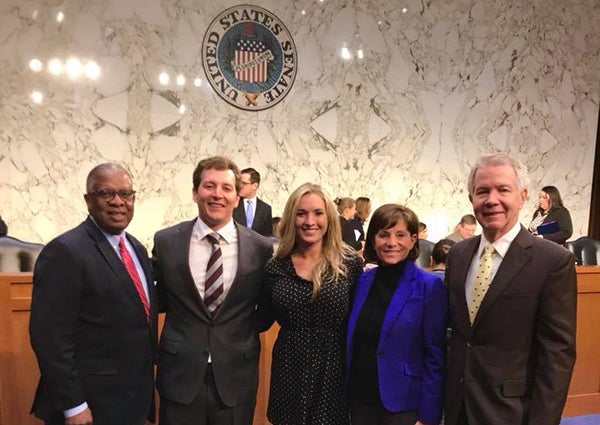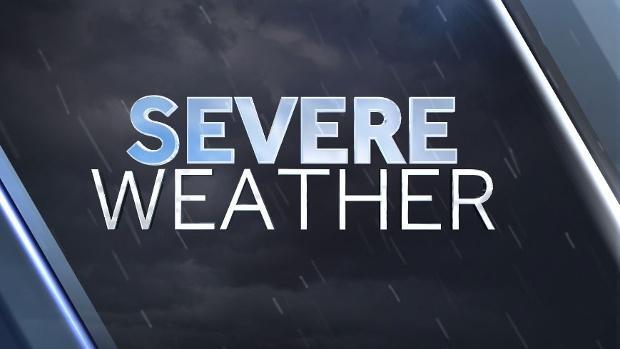Golding: US needs to invest in waterways
Published 7:31 pm Wednesday, March 6, 2019

- Vicksburg Mayor George Flaggs Jr., from left, Austin and Kirsten Golding, and Melody and Steve Golding at the U.S. Capital in Washington D.C., during Austin Golding’s testimony before the U.S. Senate Commerce, Science and Transportation Committee Wednesday. (Submitted/The Vicksburg Post)
America needs to make a larger investment in its inland waterways to ensure its carriers can continue meeting the nation’s needs now and in the future, Golding Barge Line president Austin Golding said Wednesday.
Golding testified before the U.S. Senate Commerce, Science and Transportation Committee at the invitation of its chairman, Sen. Roger Wicker, R-Mississippi.
“An investment in our inland waterways system not only benefits economic interests but also environmental interests as well,” Golding said. “Flood control, municipal water supply and recreation are all positively impacted by investments in our inland waterway system.”
One of the biggest investments, he said, is upgrading and maintaining the country’s waterway infrastructure, adding many of the locks and dams that Golding’s and other transportation company boats transit are well beyond their designed life.
According to the Waterways Council, a national organization that promotes maintaining an efficient waterways system, the inland waterways system includes 12,000 miles of commercially navigable channels and some 240 lock sites.
“Many corners of this country are perilously close to losing their gateway to the world market. Many of the products that move by barge travel through multiple locks before reaching their destination,” Golding said.
“An investment in a lock in Kentucky may mean products from West Virginia can reach their end market in Texas, Louisiana or abroad. As a vessel operator, I can attest that many of these structures are in dire need of modernization or replacement.
“The incredible scale of the locks and dams, as well as size of the network of which they are a part, requires constant maintenance. The value that these locks and dams bring to our country far exceeds their scale and size.”
Considering the amount of cargo that is carried along the inland waterways, he said, investments in locks and dams may be the best investment in bulk commerce this country can make.
According to the Waterways Council, in 2014, 604 million tons of waterborne cargo transited the inland waterways, a volume equal to roughly 14 percent of all intercity freight and valued at nearly $232 billion.
And the cargo that passes through one lock, Golding said, “May wind up on countless roads or rail lines before meeting its end consumer. An investment in locks and dams needs to happen before this cargo is forced on to our already congested roads, rail and pipelines.”
Support Jones Act
Besides upgrading and maintaining the nation’s inland waterways, Golding also asked the Senate to continue support for the Jones Act, which he said ensures the U.S. has a robust maritime and shipbuilding talent base.
“That is something worth protecting,” he said. “Without the Jones Act, this country will be looking for foreign shipyards to build the vessels that protect not only the goods we produce but also our citizens themselves. Our security as a nation is too important to be outsourced around the world.”
Golding also talked about the job opportunities in the inland waterway industry, pointing out that a young man or woman can start as an entry level deckhand earning $30,000 a year, and within one to two years can be promoted to tankerman at a salary of $70,000 a year.
“If a mariner is particularly talented and dedicated to their craft, they can train to be a pilot and be credentialed as such within five to seven years, sometimes faster,” Golding said.
“A towboat pilot starts out making $135,000 a year and can make over $200,000 with tenure. Our industry routinely takes young men and women out of high school and develops them into someone earning well over $100,000 a year before they are 30 years old. That is the American dream.”
Work with Hinds CC
He also discussed the deckhand school at Hinds Community College.
“We have seen improvements in our safety performance, as well as improved entry level retention. Programs like this could be duplicated across the country to introduce more people to this sometimes overlooked and undervalued occupation,” he said.
“One of the lesser known benefits of the inland maritime industry is how green we are,” Golding said. “We are able to move cargo with the lowest carbon footprint among other transportation modes to move the same tonnage. We are stewards of the environment in which we operate as it is nature itself.
“An investment in our inland waterways system not only benefits economic interests but also environmental interests as well,” he said.
“Flood control, municipal water supply and recreation are all positively impacted by investments in our inland waterway system. With bulk cargo volume expected to increase in the future it only makes sense to ensure the vitality of our maritime industry so it can be the first choice to answer this need.”






